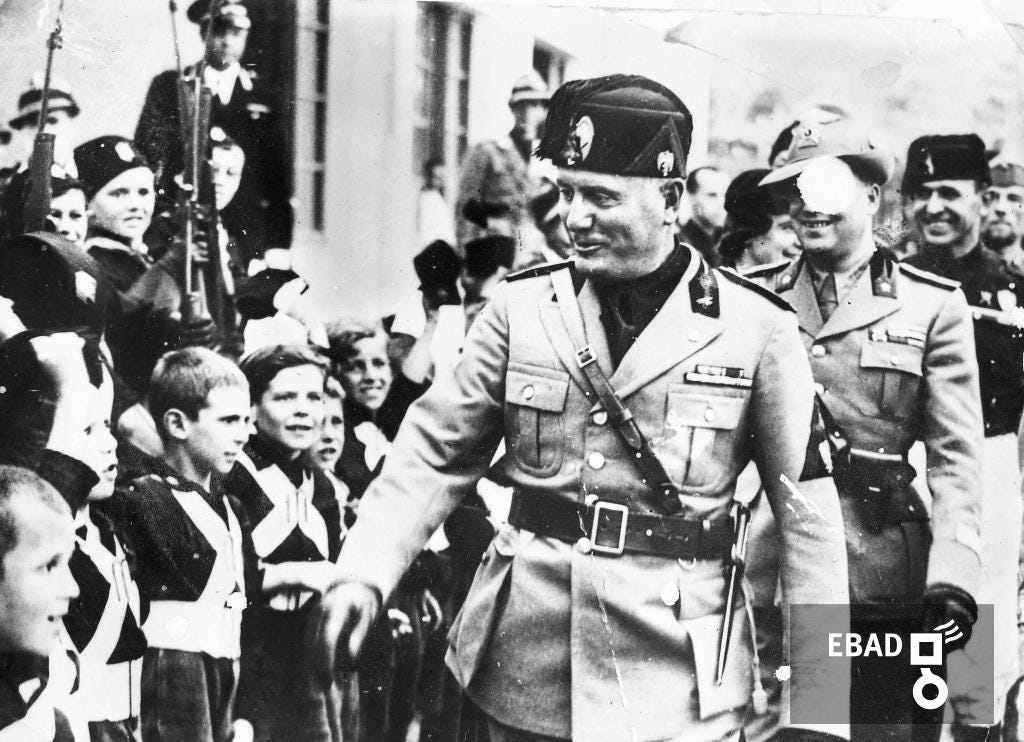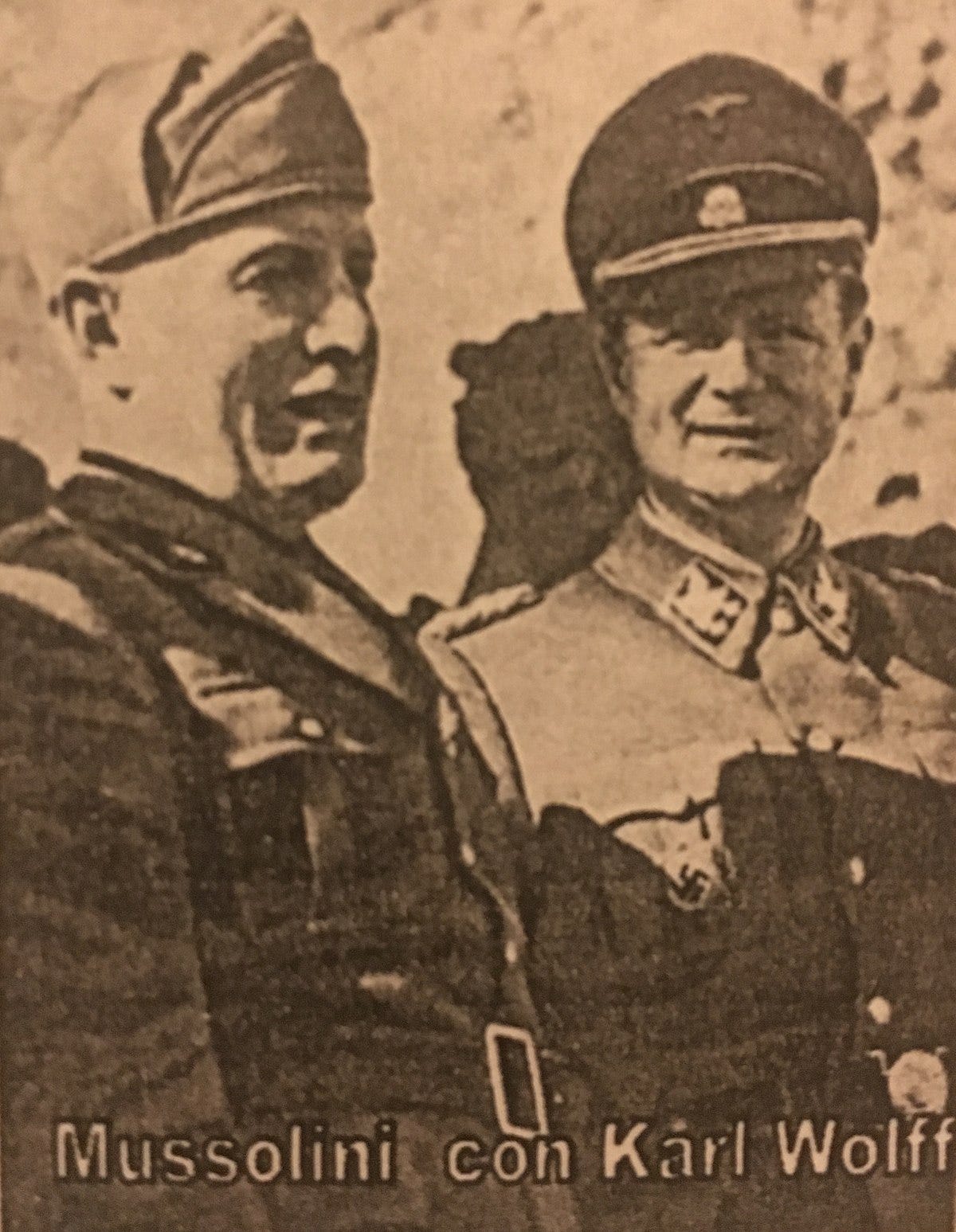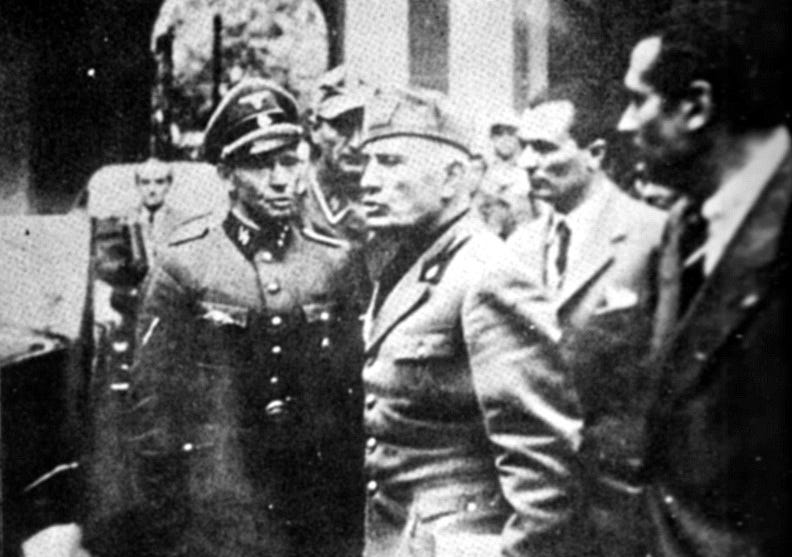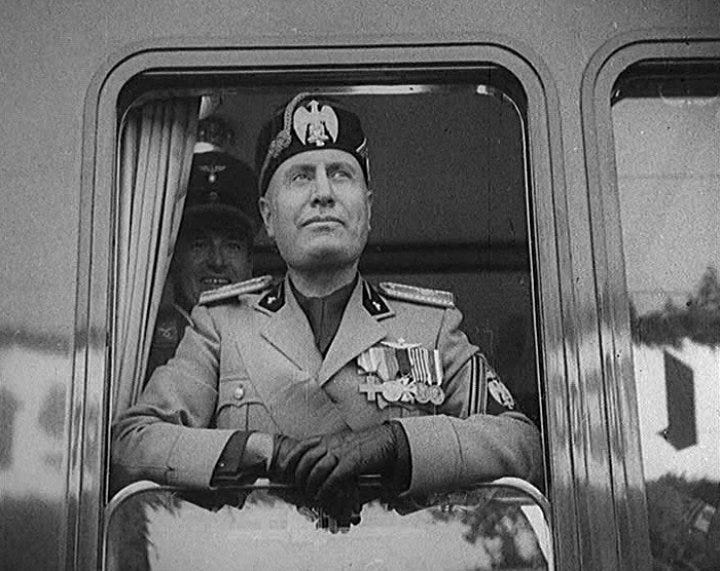During the waning months of WWII, Mussolini became very reflective on the situation. He knew what would happen but he remained very calm. He looked back on the war years, admitting he had made mistakes, which he could see now. on March 20, 1945 on an island in the middle of Lake Garda, he was interviewed by journalist Ivanoe Fossani, accompanied by a guard and a police dog. He was very open about all his thoughts regarding the past several years. He said he regretted having had so many ‘idolaters’ surrounding him during the pre-war and early war years. '“I heard the word genius perhaps a hundred times a day,” he said with disgust.
Very notably though, he said others had made greater mistakes and all his mistakes would have been forgotten if the war had been conducted by the Germans with ‘more restraint’. He said he had opposed the war against Russia (which is true). He foretold that China would come to dominate Asia, and said, and I quote, “How can England and America fail to see so enormous a danger?”
The interview concluded with Mussolini saying, “I have been a prisoner ever since I was arrested in the King’s villa.” Fossani recounts that he lowered his voice then and said, “There is no longer any escape. To our enemies we are those who must surrender unconditionally, to the others we are traitors… I have no illusions about my fate. When it is done they will spit on me, but perhaps later they will wipe me clean. And then I shall smile because I shall be at peace with my people.”
Fossani and Mussolini silently shook hands at the conclusion of the interview. Fossani said he was deeply impressed with the calm dignity of this “great, unfortunate man in his hour of tragedy” and that as he boarded the boat to return to the mainland, the dog “leapt onto a rock where it let out a long, shrill howl”.1
French poet Pierre Pascal spoke to Mussolini in 1945. Pascal had been the chief editor of The Voice of France in Vichy France and inspector general of radio for the government, but had to flee to Italy to avoid execution by the De Gaullists (and I think it is fair to call the returning French Army De Gaullists). The Duce asked him if he believed in God. Mussolini then said he was not sure, and wished that he could be. Pascal tried to veer the discussion towards politics, which Mussolini was uninterested in talking about, but when Pascal spoke of the necessity of uniting Europe fend of the machinations of the Anglo-Americans, Mussolini said, “That will be the task of your generation, and of the next one.”2
Another journalist who visited him in 1945, Madaleine Mollier, said he ‘was not so much resigned as humble.’ When she met with him, he asked, “What do you want to know? Seven years ago I remember you came to Rome. I was an interesting person then. Now I am defunct. But I am not afraid anymore. Death is a thank-you letter to God who has suffered so much.
This morning in my room a little swallow was trapped. It flew around desperately in the room until it fell exhausted on my bed. I picked it up with care so as not to frighten it, opened my window, then opened my hand. It did not understand at first and looked around, before opening its wings and flying, with a little cry of joy, out to freedom. I shall never forget that cry of joy. But for me, the window will never open except to let me out to death.”3
He was clearly wrestling with his thoughts on God during the final months of his life. During a meeting with the German officers on April 6, he interrupted defensive planning by asking Eugen Dollman, “Tell me Colonel, do you believe in God? General Wolff does” (General Wolff was one of the two major generals in command in Italy).4
General Wolff and Dollman were negotiating the surrender of the German forces in Italy without informing Mussolini OR Graziani, but there surrender attempts were being hampered by Himmler, who put both under Gestapo supervision for negotiating without permission. In March, he had sent his appeal to the Allies through Cardinal Schuster (this was in fact received by the Allies but was rejected). He refused to entertain unconditional surrender. It seems some of Mussolini’s former strength returned near the end. He assumed real control over Italy during the last weeks of the war. On April 19, he moved his government (what was left of it) to Milan against the advice of the Germans. He said, “Now Rome is lost. Milan is the only capital of the Italian Republic.” However, he was shadowed by SS Lieutenant Fritz Birzer at all times.
When on April 25th he learned the Germans were negotiating behind his back, he declared, “This time we shall be able to say that it is Germany who has betrayed Italy.” In Milan, many things happened. Mussolini had a personal meeting with Cardinal Schuster during which he confided in the Cardinal his plan to mount a last stand in the mountains with 3,000 Blackshirts.
Schuster replied, “I know the Blackshirts who will follow you are rather 300 than 3,000 as some would have you believe.” Mussolini simply smiled, “You may well be correct.” Cardinal Schuster did most of the talking during their meeting. He did what a good Catholic would do, and spoke to Mussolini of ‘expiation and atonement, of imprisonment and exile.; but Mussolini might not have been listening, although when he mentioned Napoleon there was a glint of pleasure in his eyes, and once when he spoke of God’s forgiveness they filled with tears.’ Schuster finished the meeting and gave the Duce a copy of Storia di San Benedetto (writings of a very old Catholic Saint) which Mussolini accepted and placed in a brown envelope.5
Cardinal Schuster then oversaw a meeting between the Italian fascists and the Italian partisans. The partisans demanded unconditional surrender within two hours. Different accounts say Mussolini was about to agree or did not consider it at all. But in any case, Marshal Graziani stood up and said the Italians could not surrender and abandon their German allies, as this would be dishonorable. This was obviously a shot across the bow at the partisans, as it insinuated they were traitors since 1943. Mussolini was then informed by Cardinal Schuster that the Germans negotiated through him with the Allies. Mussolini angrily declared, “Now we can say it is the Germans who have stabbed Italy in the back.”
The partisan leaders were mesmerized by his following speech, and one later said, “Deep down, I feel for him” (great man of history effect). Ultimately, the meeting when nowhere and Mussolini starkly refused unconditional surrender, saying, “I’m not here for that. I was told we were here to meet and discuss conditions. That’s why I came - to safeguard my men, their families, and the Fascist Militia. I must know what is to become of them. The families of the members of my government must be given protection. Also I was assured that the Militia would be handed over to the enemy as prisoners of war” (the partisans refused to treat the Black Brigades as POWs).
He and his men left Milan and arrived in Como region (very close to the Swiss border). Mussolini sent out the call for loyal Blackshirts to rally to him for a final stand. He had a collection of documents which were lost after his capture but what he at the time said contained proof of the Fascist government’s behavior during the war as well as proof of England’s responsibility for the World War (which we now know), among other things.
He then wrote a letter to his wife, which read as follows:
“Dear Rachele,
Here I am at the last stages of my life, the last pages of my book. We two may never meet again. That is why I am sending you this letter. I ask your forgiveness for all the harm I have unwittingly done to you… Take the children with you and try to get to the Swiss frontier. There you can build a new life. I do not think they will refuse to let you in, for I have always been helpful to them, and you have had nothing to do with politics. Should they refuse, surrender to the Allies, who may be more generous than the Italians. Take care of Anna and Romano, especially Anna who needs it so badly. You know how I love them. Bruno in heaven will help you.
My dearest love to you and the children,
Your Benito
Year XXIII of the Fascist Era
Rachele received the letter and sent an urgent telegram which made it through. She asked what Mussolini would do, and he said he would ‘follow his destiny’ and repeated what he had said in the letter, telling her to escape with the children and saying, “Forgive me for all the harm I have done to you. Your life might have been quiet and happy without me.”
She told him he still had supporters who would fight for him and he answered, “They’re all gone I’m afraid… I realize quite well it is over.” He then spoke with his 17-year-old son Romano, who begged him to come with them. Rachele decided not to go straight to Switzerland and drove to Como where she and Mussolini spoke one last time. Mussolini, a handful of Italians, and a German escort made their way to Menaggio where the “3,000 Blackshirts” would be. Pavolini met them there in an armored car and with the men who had answered the call. There were twelve.
The last stand in the mountains would not happen. Mussolini, the fascists, and the Germans decided to make for the German frontier. Once they were in Germany, the fascists could make for Switzerland if they chose. On the road there, they were stopped by a partisan squad. The 200 Germans could easily have blasted their way through but the partisans said they would let them through without bloodshed if they turned over any Italians with them. A priest came down from his church to mediate between the two sides. The Germans and partisans negotiated for hours, until it was finally agreed the Germans would let the partisans search their vehicles.
In any case, the fascist leaders were turned over but the Germans went to greater lengths to hide Mussolini and he was not discovered at the first stop. He was discovered later at Dongo, as a passing bicyclist had seen him speaking with the Germans and told the partisans to expect him in the town.
A partisan found him in the armored car wearing a Luftwaffe trench coat, with a submachine gun and pistol on him. He wasn’t sure it was Mussolini at first, and asked, “Aren’t you an Italian?”
Mussolini looked up and said, “Yes, I am an Italian.”
The partisan was so shocked to see Mussolini and that his gaze was on him, that he exclaimed, “Excellency!” (another great man of history moment). The Germans did not fight, as Mussolini ordered them to stand down. The partisan who found him, Lazarro said his “face was ashen… One read by his eyes that he was extremely tired, but not afraid… he no longer had anything to do among men.” People of the past had a much better way with words than we do today.
The partisans took his briefcases of documents, and he told them to be careful and that they contained documents important to the future of Italy. The partisans brought him into the mayor’s office, where he was allowed to sit down. They and the townspeople asked him for hours.
“Why did you betray Socialism?”
“I did not. Socialism betrayed itself.”
“Why did you murder Matteotti?”
“I had nothing to do with that.”
“Why did you stab France in the back?”
“It would take too long to explain why Italy had to enter the war.”
This went on for a while, and he answered every question that was asked, until the partisans moved him elsewhere. That night, the partisans, a very young group, most were teenagers had a meal prepared, and sat down for dinner with their former leader. What happened was predictable, with any great man of history. During and after the meal he ‘spoke to the guards as a garrulous don might have spoken to party of nervous students.’ The partisans listened to him and did not interrupt. He told them of his visits to Russia, spoke of Stalin and the Soviet Union as the real victors of the war, elaborated on the natures of National Socialism and Bolshevism, foretold the collapse of the British Empire.
A young partisan, in his teens, named Marioni said, “Sometimes he looked worried, but never frightened. He did not seem concerned about his fate. He said to my friend and I, ‘Youth is beautiful.’ My friend smiled as he said this and he said, ‘Yes, I mean it. Youth is beautiful. I love the young even when they bear arms against me.’” Then he took a gold watch from his pocket and gave it to them.
These same partisans were not the ones to execute Mussolini. In fact, their intention seems to have simply been to hold him captive until the war officially ended. Mussolini and Clara Petacci were taken from the town by Walter Audisio on orders from the CLNAI (partisan command structure). The partisans weren’t really a singular group, and the orders were given by faction members who wanted him dead it seems. The Americans had already heard he was captured and were trying to find where he was being held.
Audisio and his men entered the room Mussolini was in and in a cowardly way told him he’d come to rescue him. Mussolini sarcastically replied, “Really! How kind of you.”
Audisio brought them to a courtyard, flanked by one of his men, and informed them that he would “render justice to the Italian people.” Clara protested, saying he couldn’t just execute them like this, and flung herself on his machine gun. He pulled the trigger, but the gun was jammed. He pulled his pistol and aimed it at her, but it too jammed. Frantic, he shouted to his man to give him his gun. This was finally fired, and killed Clara. Mussolini opened his jacket with both hands and said, “Shoot me in the chest.” Audisio did so, and Mussolini collapsed against the wall behind him, laboredly breathing until Audisio shot him to death. Their bodies were then taken to Milan.
A brief aside is two Fascist leaders who were hung alongside Mussolini’s body and how they were captured. Allessandro Pavolini was captured in the convoy before Mussolini was, but he escaped, swam almost two miles across the lake, but was spotted before he could get ashore by partisans. He engaged in a Mexican standoff with them since he had a pistol, using a rock in the water as cover, but was captured after he ran out of ammo. Achille Starace had been a fascist prior to the fall of the regime in 1943, but hadn’t been in politics since then because he was considered a sycophant and goofball by the Germans and a lot of fascists (look up some of the stunts he pulled, like jumping through a flaming hoop at a sporting event). He was on his morning jog in Milan when he was recognized and captured. He was shown Mussolini’s body, which he saluted before being shot.
We all know that Mussolini, Clara, and several Fascist leaders’ bodies (like Bombacci, Pavolini, and Starace were hung from a petrol station in Milan by Communists (who have a penchant for desecrating bodies). Surprisingly, in several books I’ve read, the authors and the Italians they quote, were disgusted by the spectacle.
Swiss journalist Antal Mazzoti described the details of the desecration of the bodies. He said after witnessing the event, “After fifteen minutes I felt fed up once again with everything… I left, pushing my way out angrily with my elbows, desperate to get rid of the knot in my throat. I was railing - and God knows what I was saying - against everyone, including that foul beast of a crowd that in the past would have rushed to any piazza in Italy to scream deliriously for Mussolini.”6
Of course, Italy fell into chaos after the war, rocked by fights between the new liberal democracy and the communists (and later the fascists, once they had recuperated). The Fascists held significant power in Italy after the war, but the USA kept a watchful eye on them to make sure they didn’t get too powerful.
This would be the end, but it so happens that we have an interesting revelation about Mussolini from beyond the grave. Now we’re all skeptical of things like this, and I wouldn’t include it. But this revelation is from Edvige Carboni, an Italian Catholic woman who was known for her visions from God, where Jesus and Saints, among others, visited and spoke to her. The reason I include this is because she is beatified by the Catholic Church (by Pope Francis, in fact), so I think it stands to reason that she is someone to be taken seriously.
Based on what we know from history, it seems apparent that down to the end, Mussolini was wrestling with the question of God and repentance. Carboni seems to have been given the closest thing to an answer we will get in this life.
While she was praying before a Crucifix, a vision of a man surrounded by flames appeared before her. He spoke to her, saying, ‘I am Benito Mussolini. The Lord has allowed me to come to you in order to get some relief from my sufferings in purgatory. I beg you as an act of charity to offer for me all your prayers, sufferings and humiliations for two years, if your director allows it. God’s mercy is infinite but so is His justice. One cannot enter Heaven until one has paid the last penny of the debt owed to Divine Justice. Purgatory is terrible for me because I waited until the last moment to repent.’
During the Spring of 1951, recorded in Carboni’s diary, “Jesus told me after Holy Communion, ‘This morning the soul of Benito Mussolini has entered Heaven.’”
For Mussolini, I think he is a great example of Mark 8:36: “For what doth it profit a man if he gain the whole world, and yet forfeit his soul?” Had Mussolini won the war, who knows if he would have repented. Knowing that he was a proud man, maybe not, maybe he needed to be humbled. God can work in many ways. My reflection on this is that Mussolini may have lost the war, but his soul was not forfeit.
And that is the victory.
“Death is a thank you letter to God, who has suffered so much.” -Benito Mussolini
Interview with Ivanoe Fossani, Mussolini si confessa alle stelle, 20 March 1945 (1952).
Interview with Pierre Pascal, Mussolini alla vigilia della sua morte e l’Europa (1948).
Interview with Madeleine Mollier, Pensieri e previsioni di Mussolini al tramonto (1948).
Dollman, Eugen. Roma Nazista (1949).
Schuster, Idelfonso. Gli ultimi tempi di un regime (1946).
ADN, DG/87, Antal Mazzotti, Sotto il tallone nazifascista, 29 April 1945.








